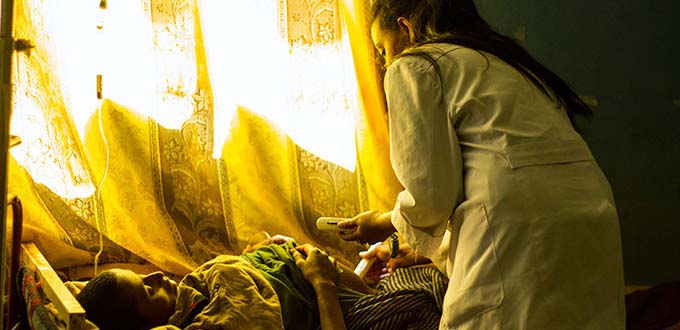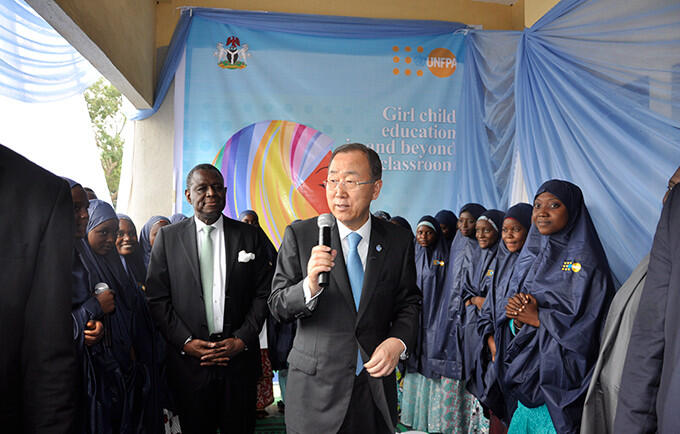ABUJA, Nigeria – “I am proud to be a girl.” These were the bold closing words of a drama performed by 15 girls for United Nations Secretary-General Ban Ki-Moon and UNFPA’s Executive Director Dr. Babatunde Osotimehin, in Nigeria’s capital, Abuja.
It is a tragically uncommon sentiment in the northern state of Kaduna, where the young performers come from. The skit dramatized concerns they face in their everyday lives: entrenched gender inequality, lack of access to school and health care, child marriage, and adolescent pregnancy.
But the girls were defiant in the face of these challenges. “I will stand up, stand out and stand strong,” they chanted, receiving applause from the dignitaries in the audience. “I choose to make a difference!”
Mr. Ban and Dr. Osotimehin praised the girls' determination and emphasized that the UN stands behind them. “The United Nations is committed to ensuring that every girl, regardless of her age, culture or background, has access to equitable and quality education and, importantly, expresses her right to be a girl and not a child bride,” Mr. Ban said.

Embracing their rights
The 15 performers are participants in Action for Adolescent Girls, a UNFPA-supported programme that teaches vulnerable girls about their rights, their bodies and health. Ten of the girls are currently enrolled in the initiative, and five are graduates who are training to become mentors in the programme.
One of the key messages in the initiative is about the harms of child marriage – a practice most prevalent in Nigeria’s north. Child marriage is a human rights violation, and it often results in girls dropping out of school and being deprived of future opportunities. Girls in the programme also learn about the dangers of becoming pregnant before they are physically or mentally ready for motherhood. Complications of pregnancy are one of the leading causes of death among adolescent girls in developing countries – and, indeed, northern Nigeria has one of the highest maternal mortality rates in the country.
During their performance, the adolescents called on Dr. Osotimehin to explain, in a single sentence, how girls can avoid child marriage and take control of their futures. Without hesitation, Dr. Osotimehin responded: “Get educated.”
After the performance, Mr. Ban shook the girls’ hands and told them that their rights are a priority. “We are working closely with the Government and relevant parties to ensure that these rights are upheld,” he said.
UNFPA strengthening support to women and girls
Action for Adolescent Girls operates around the world, working with governments and community members to empower girls to embrace their rights. The programme in Nigeria’s Kaduna State began in September 2014, and currently reaches 400 girls. In 2016, it will be expanded to cover two more states – Kebbi and Sokoto – with plans to reach 131,000 girls.
Additionally, on 27 August, UNFPA’s representative in the country, Ratidzai Ndhlovu, met First Lady Aisha Muhammadu Buhari to discuss future joint efforts on improving maternal, newborn and child health. Collaborations will focus on reaching the poorest and most vulnerable communities in Nigeria.


